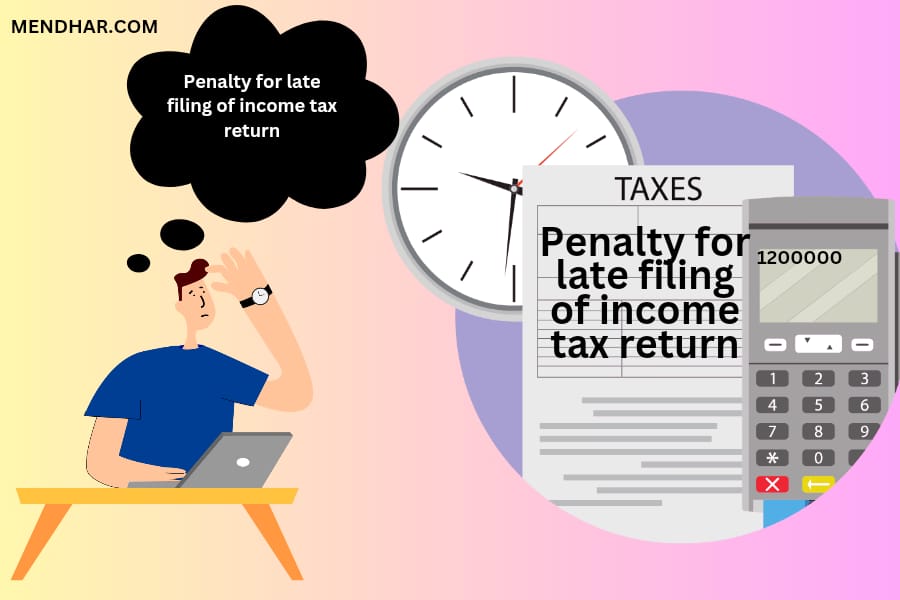Table of Contents
TogglePenalty for Late Filing of Income Tax Return: What You Need to Know
Filing your income tax return on time is crucial for every taxpayer. Not only does it keep you in good standing with the tax authorities, but it also helps you avoid unnecessary penalties. However, despite the best intentions, sometimes life gets in the way, and you might miss the deadline. This article explores the “penalty for late filing of income tax return,” its implications, and answers common questions related to this issue.

Understanding the Penalty for Late Filing of Income Tax Return:
The penalty for late filing of income tax return is a fine imposed by the tax authorities when you fail to file your income tax return by the stipulated deadline. In many jurisdictions, this deadline is typically at the end of the fiscal year or on a specific date designated by the tax authority. For instance, in India, the deadline is usually July 31st for individuals, unless extended by the government.
When you miss this deadline, the consequences can vary depending on how late you file and the specific regulations of your country. In India, under Section 234F of the Income Tax Act, a late filing fee is levied. If you file your return after the due date but before December 31st of the assessment year, the penalty is Rs 5,000. However, if you file your return after December 31st, the penalty increases to Rs 10,000. For small taxpayers whose total income does not exceed Rs 5 lakh, the penalty is restricted to Rs 1,000.
Apart from the monetary penalty, filing your income tax return late can also result in other inconveniences. For instance, you may lose the ability to carry forward certain losses, and there could be delays in receiving refunds. Moreover, the tax department may scrutinize late returns more closely, increasing the likelihood of audits.
Financial and Legal Implications of Late Filing:
The financial implications of the penalty for late filing of income tax return are significant. Firstly, the immediate financial burden of paying the penalty can be substantial, especially if you fall into a higher income bracket. The Rs 10,000 penalty for filing after December 31st can be a considerable amount for many taxpayers. Additionally, if you owe taxes, interest on the unpaid tax amount is also charged, typically calculated from the original due date of the return until the date of payment.
Moreover, repeated late filings can lead to more severe consequences. Tax authorities may view chronic late filers as negligent or non-compliant, which could lead to more stringent scrutiny and audits. In extreme cases, persistent non-compliance can even result in legal actions, including prosecution and imprisonment, although this is generally reserved for more severe tax offenses.
It’s also important to note the psychological stress and anxiety that can accompany late filing. The worry about penalties, interest, and possible audits can be overwhelming. Therefore, it’s crucial to be aware of the filing deadlines and make every effort to file on time to avoid these penalties and related stress.
Strategies to Avoid the Penalty for Late Filing of Income Tax Return
To avoid the penalty for late filing of income tax return, planning and organization are key. Here are some strategies to help you file on time:
Stay Informed: Keep yourself updated with the tax filing deadlines. Tax authorities often announce these dates well in advance, and any changes or extensions are usually communicated through official channels and media.
Organize Your Documents: Gather all necessary documents well before the deadline. This includes income statements, investment proofs, and any other relevant financial documents. Having everything in order makes the filing process smoother and quicker.
Use Technology: Leverage online tax filing platforms. Many countries have online systems that simplify the filing process, reduce errors, and often come with reminders and alerts for important dates.
Seek Professional Help: If your financial situation is complex, consider hiring a tax professional. They can ensure your return is accurate and filed on time, saving you from penalties and other issues.
File Early: Don’t wait until the last minute. Filing early not only helps you avoid penalties but also gives you ample time to address any unexpected issues that might arise.
Frequently Asked Questions (FAQs)
1. What is the penalty for late filing of income tax return?
The penalty for late filing of income tax return varies by country. In India, for example, it is Rs 5,000 if you file after the due date but before December 31st, and Rs 10,000 if you file after December 31st. For small taxpayers, the penalty is restricted to Rs 1,000.
2. Can I get an extension for filing my income tax return?
Yes, in many countries, taxpayers can apply for an extension. However, it’s essential to note that an extension to file is not an extension to pay. Any taxes owed are still due by the original deadline to avoid interest and penalties.
3. What happens if I don’t file my income tax return at all?
Not filing an income tax return can lead to severe consequences, including fines, interest on unpaid taxes, and possible legal action. In some cases, chronic non-compliance can result in prosecution and imprisonment.
4. Are there any exceptions to the penalty for late filing of income tax return?
Exceptions can vary by jurisdiction. In some cases, if you can demonstrate a reasonable cause for the delay, such as a natural disaster or severe illness, the tax authorities might waive the penalty.
5. How can I calculate the interest on unpaid taxes due to late filing?
Interest is typically calculated from the original due date of the return until the date of payment. The rate and method of calculation can vary, so it’s best to refer to the specific guidelines provided by your country’s tax authority.
6. Can late filing affect my ability to get a tax refund?
Yes, filing late can delay your tax refund. The tax authorities process returns in the order they are received, so the earlier you file, the sooner you can expect to receive your refund.
7. What should I do if I realize I’ve missed the filing deadline?
If you’ve missed the deadline, file your return as soon as possible to minimize penalties and interest. Additionally, pay any taxes owed immediately to reduce further charges.
In conclusion, the penalty for late filing of income tax return is a serious issue that can have significant financial and legal implications. By staying informed, organized, and proactive, you can avoid these penalties and ensure that your tax affairs are in order. If you ever find yourself in a situation where you might miss the deadline, remember that timely action can help mitigate the consequences.

